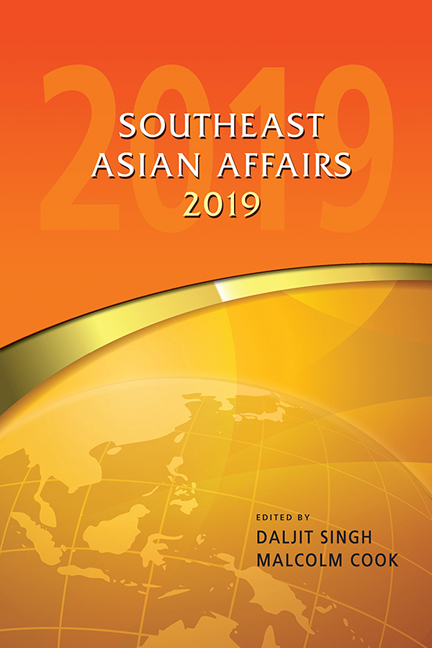Book contents
Thailand in 2018: Military Dictatorship under Royal Command
from THAILAND
Published online by Cambridge University Press: 07 September 2019
Summary
On 22 May 2014, Thai army chief General Prayuth Chan-ocha staged a military coup — two days earlier he had declared martial law for the entire territory of the kingdom. The junta, renamed the National Council for Peace and Order (NCPO), abolished the 2007 constitution and replaced it with an interim constitution banning political parties and elections. In April 2015 it lifted martial law only to replace it with NCPO Order 3/2015 prohibiting gatherings of more than five people.
Upon seizing power the NCPO had promised to return the country to democracy according to a roadmap stipulating for the drafting of a new constitution and the organization of elections. Following a referendum in August 2016, the newly crowned King Vajiralongkorn, who had ascended to the throne in December 2016, promulgated a new “permanent” constitution in April 2017. Elections were then planned for November 2018, which were later delayed to February then March 2019. In 2018, in preparation for the upcoming election, the military government lifted some of its restrictions on political activities. It allowed the registration of political parties in March and lifted the ban on political gatherings in December, after more than four years under martial law and NCPO Order 3/2015. In both cases, Prayuth used his absolute powers under Article 44 of the 2014 interim constitution to lift his previous orders.
The general election planned for 2019 will certainly not “return” democracy to Thailand. The planning and organization of elections following a military takeover is part of a regular pattern in Thailand, and has been called the “vicious cycle of Thai politics” (wongchon ubat). Each cycle starts and ends in a military coup. First a coup is staged, with martial law declared and the constitution abolished. A short interim constitution banning both political parties and elections is promulgated instead. The interim constitution is in turn followed by a permanent constitution providing for elections, only to lead to a further crisis and a military or judicialmilitary coup, installing a military government. In 2006, the democratically elected leader Thaksin Shinawatra was ousted by a military coup, the 1997 constitution abolished and replaced with the 2006 interim constitution, followed by the permanent 2007 constitution adopted by referendum. Elections were held in December 2007, only for the subsequent government of Samak Sundaravej to be dismissed by the Constitutional Court in 2008.
- Type
- Chapter
- Information
- Southeast Asian Affairs 2019 , pp. 327 - 340Publisher: ISEAS–Yusof Ishak InstitutePrint publication year: 2019



